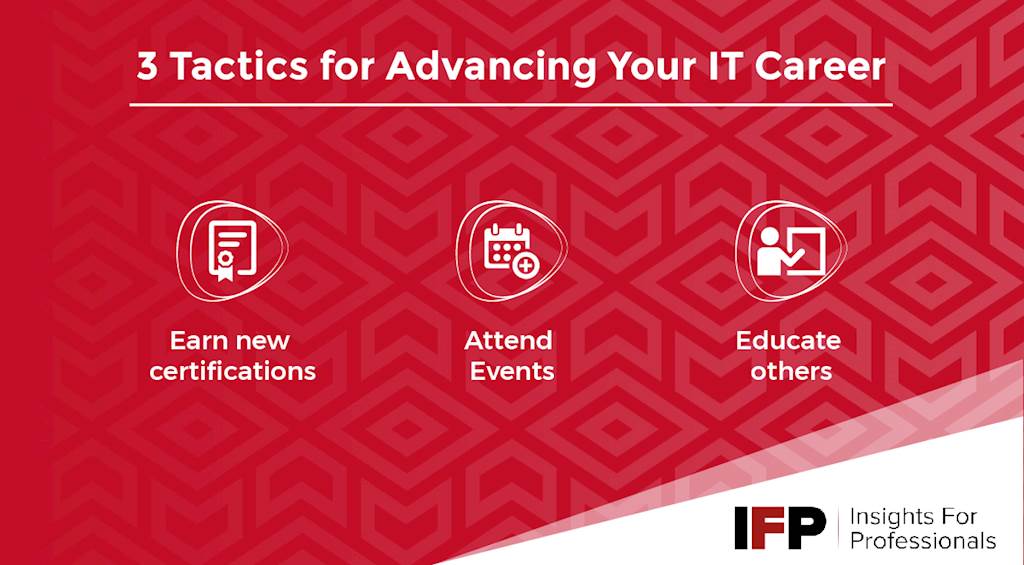Despite the industry’s inevitable progression and the fact that IT is now ingrained in every aspect of our working lives, individual advancements cannot be guaranteed, but can be fast tracked and ensured with a good plan.
Forward thinking IT managers should have a clear vision of which path they’d like their career to take, accompanied by the tactics and incremental goals that will take them there.

Earn new certifications
Trends set in IT can change overnight; tech is evolving rapidly and the progression is only accelerating over time. You only need consider that the smartphone you may be reading this article on has more computational power than the Apollo Guidance Computer that landed man on the moon back in the 1969. ENIAC, the first computer, was invented just a quarter century before that.
Even the traditional seats of learning are having to run to keep up; colleges and universities all across the country are continuing to develop a vast array of long and short courses, full-time and part-time, led by industry practitioners. These courses cover everything from cyber security and office systems to advanced coding and programing.
Online platform based learning has also seen a spike in popularity, allowing access to training and resources for those that wish to learn in their own time in a remote location. Treehouse is a popular choice, with “over 1000 videos created by expert teachers on web design, coding, business and much more”. US based not-for-profit Codecademy boasts over 25 million users from around the globe, and their resources are entirely free to access. Resources vary from coding languages like advanced HTML and Ruby on Rails to business tutorials on corporate structure, finances and marketing, all of which will be valuable skills to develop and showcase when attempting to elevate your position within a company.
A study conducted by Brainbench in Chantilly, VA, revealed that certifications are a bankable asset for IT professionals; those with certifications are significantly more likely to receive salary increases above the industry average of up to 3 percent. Further, according to the 2012 Learning Survey by Niace, the adult learning organization, there's a strong correlation between learning and sustained employment. Staff who undertake learning activities are better able to adapt to the changing requirements of an organization and gain a competitive edge in the job market. With such a wide variety of IT specific certification and qualifications available, it is worth taking the time to research and consider further training to improve your career prospects.
Attend Events
Networking events can expose you to new ideas and new thinking and exist in both traditional and untraditional formats. We are all aware of the giants, like Infosecurity Europe who brought together 15,614 information security professionals from over 80 different countries for their 2015 event but there are a number of other options. Signing up to resources like Tech London Advocates will keep you in the loop on some of the country’s biggest and best networking events, keeping you informed with regular news. However, there are also more informal meet ups held which can be found through resources like meetup.com.
Events offer an engaging and interactive forum for product and innovation discovery. Many keynote speakers will engineer their presentations around their own offering or businesses expertise. Some brands also use events for product launches. Very often, product launches will present a unique opportunity to explore and sample the latest innovations, platforms, technologies and products set to affect either business in general or specific industry verticals. With this in mind, events can present an interesting opportunity for you to learn from and ask questions of those at the forefront of emerging technology. This information can help you to develop a robust business case for the adoption of a product or service once you return to the office.
Educate others
Mentoring, whether inside or outside the workplace, on a one-to-one basis or in a group setting, is an effective way to share your wisdom, gain exposure and earn professional credibility. If you don’t have anyone requiring or requesting your skills as a mentor, industry specific online forums are a great way to fine tune your teaching and explaining skills.
Advice given and comments made can help to develop a positive online footprint positioning you as an expert voice within your field. It is important to remember, however, that any comments can live for an eternity online. When you answer a question or make a point, consider that it will be accessible for a long time to come and depending on the forum rules, may not be able to be deleted.
Engaging online with a concentrated audience of peers, mentors and mentees via a legitimate platform can be powerful for personal development but remember that the strength and weakness of these forums is that anyone can post anything, no matter how true. Ensure that your responses are considered and well-measured and that you refrain from reacting to any negativity or conflict in a knee-jerk manner.
IT Managers should also consider sharing their knowledge across the entire organization. Department heads can all benefit from a knowledge share across business functions. Consider proactively establishing the platform to allow for HR, Finance and Sales heads to discuss ideas and enable information transfer. This doesn’t have to be an overly formal activity; a monthly coffee or after work drink could suffice. Taking initiative and control of an initiative like this helps to position you as an innovator and revenue driver that wants to deliver value to the business as a whole.
Access the latest business knowledge in IT
Get Access





Comments
Join the conversation...